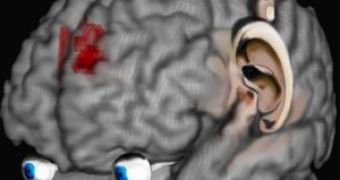This is our worst nightmare: not to be permitted our last refuge, the intimacy of our thoughts.
It's like in those futuristic totalitarian societies from SF movies.
Recently, a group led by John-Dylan Haynes of the Max Planck Institute for Human Cognitive and Brain Sciences in Leipzig, Germany has discovered - using functional magnetic resonance imaging (fMRI) - activity paths in the brain's prefrontal cortex as subjects concentrated on their choice of two future actions.
The team could distinguish cortical activity models linked to the subjects' different plans.
Previous studies had found that the prefrontal cortex turned on when people engage in goal-related neural processing; but until this study, it was not clear if patterns of activity in the area could depict the individual's current intention.
What was regarded as goal-related activity could also represent other actions, like preparing for a motor response, accessing past memories, or keeping in mind the choice.
The team observed the brain activity while subjects concentrated on their choice of intentions, prior to the proper action. The subjects were asked to choose freely between adding or subtracting two numbers and were asked to keep in mind their intention until those numbers were displayed on a screen, along with a choice of outcomes (one was correct for the addition choice, the other for the subtraction choice). After that, the subjects revealed the correct answer as they intended.
The team discovered that during the time period between the subjects' choice and execution of the task, two regions of the prefrontal cortex presented increased activity and could have been behind the two actions (addition or subtraction) they had chosen to pursue.
Many activity paths were discovered during the actual execution of the task, revealing that different brain substrates were activated in task preparation and execution. Intentions were strongly linked to the medial prefrontal cortex, and most researchers regard this brain region as a mirror of an individual's mental state.

 14 DAY TRIAL //
14 DAY TRIAL //